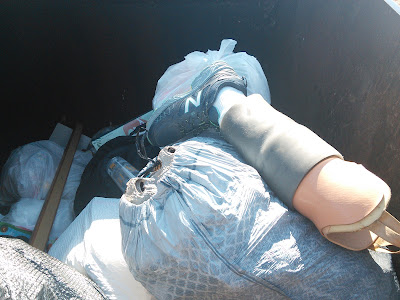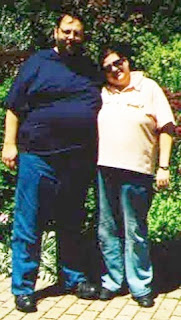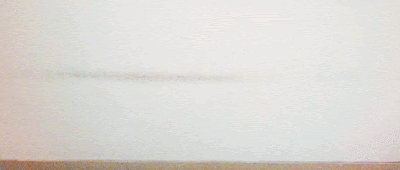Prepping for the move is a lot of work, and it's sad to be packing memories, or giving them to charity, or sometimes, unavoidably, tossing memories into the dumpster.
Here's an exception, though — a memory I'm delighted to put out with the rubbish. If Stephanie was here, she'd want to watch and applaud, and toast it
with a glass of champagne. I've just carried Stephanie's prosthetic
leg to the dumpster, and snapped a picture of it, because maybe, wherever she is, Steph has internet access.
It was 2015. Her left leg was infected, and the doctors had tried antibiotics, then stronger meds, but the infection had started eating the bone. The experts said that if she didn't have the leg chopped off, the infection would kill her, so she signed up for the surgery.
The doctors were very reassuring, though, telling Steph that she'd soon be happily walking around on a nifty new prosthetic leg.
After the surgery, she waited impatiently for months, because they can't start the process of measuring and fitting you for a fake leg until the swelling subsides in the stump that's left over — and yes, actually, 'stump' is the medically-approved term.
Eventually, Stephanie was referred for measurement at Hanger Clinics, the nation's leading chain of prosthetics-makers. We were so optimistic.
Her appointment was first thing in the morning, and we didn't understand how stupid that was until Googling it, perhaps a year later:
Your legs tend to expand as the day goes on. Grab a tape measure and check: whatever the circumference of your leg first thing in the morning, it'll be a quarter-inch bigger by mid-day. That's because blood tends to pool in your lower extremities as you sit and walk, and guess what? It's more pronounced if you have kidney problems or you're overweight — and Steph had kidney problems and was overweight.
We didn't know anything about legs swelling up, of course, but you'd think people in the business of making prosthetics would know. Hanger Clinics didn't know, or didn't care.
When the prosthetic was delivered, Stephanie walked on it, in physical therapy sessions at Hanger, and in practice sessions at home. I accompanied her down the hall and back hundreds of times, and up and down the steps in front of our not-wheelchair-accessible apartment.
She couldn't practice-walk for long, though, because wearing the leg was painful at first, and extremely painful after half an hour or so. When she complained to Hanger, they took the fake leg into the back room, (said they'd) disassembled and tweaked something inside, and she tried it on again, but she couldn't feel the difference. Or she'd feel the difference, but it would only be uncomfortable in a slightly different way.
She continued trying to walk on this misfit prosthetic, sometimes to the point that it made her stump bleed. She wanted to have Hanger re-measure and re-build it, but they refused. She wanted to raise holy hell about it, sue them if they wouldn't fix it, but she didn't want me raising hell on her behalf — she wanted to be the hellraiser herself.
She was having other health issues at the same time, though, and also she was in the midst a long-running feud with the administrators at her dialysis center (a story I haven't told yet, but for today suffice to say, they were bastards).
Eventually Stephanie settled into her wheelchair, and stopped trying to walk on a fake leg that didn't fit. The prosthetic gathered dust, and demanding repairs or replacement from Hanger Clinics was filed under "When everything else settles down." Of course, everything else never settled down, and she died, never having walked again.
Jeez, Hanger screwed her over on that leg. When she signed the receipt for it — insurance paid 100%, but still, you couldn't miss the bottom line — it cost over $15,000.
If you're reading this, Steph, here's an update: The bullshit involving your fake leg continues to this day. I don't want the damned thing, but guess what? It's illegal to sell or give away prosthetics to anyone who needs one. Why? My guess is, so no-one who needs a fake limb has a lower-priced option than spending $15K at Hanger Clinics.
Seriously — everything about the prosthetic is mass-produced. It's plastic or rubber over a metal frame, but none of it is sculpted by hand or anything. And it never directly touches the wearer's stump; there's padding and special socks between rubber and skin. Wipe the fake leg with alcohol, and it's sanitized. It could be a life-changer for anyone who's had a below-the-knee left-leg amputation — but that's forbidden by law.
There are several charities that claim to recycle used prosthetics — Hope to Walk, Limbs for Life Foundation, Standing with Hope... Their PR says they'll accept donated prosthetics, disassemble them to retrieve the complainants inside, and build artificial limbs for the injured in the third world. Near as I can ascertain, those charities are bullshit, too — I reached out to all the above, and got no response. Reached out a second time to all three, and got no response.
For a few minutes this morning, I fantasized about taking this leg back to the local Hanger office and chucking it through their plate glass window. That's not me, though... and anyway, there's probably a serial-number inside that would lead right back to Stephanie & me.
All the bullshit ends today, though. Stephanie's completely useless, $15,000, blood-gouging prosthetic leg is now in the dumpster of our apartment building. There's no champagne in the apartment, Steph, but I'm toasting the end of it with a Cherry Coke.









